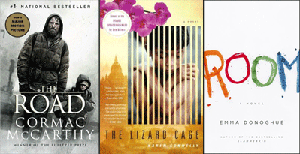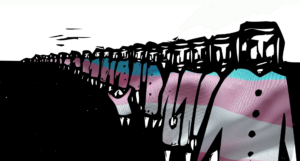Three Novels That Knocked Me Out
As Virginia Woolf said in describing the library of her elusive character Jacob, “anyone who's worth anything reads just what he likes, as the mood takes him, and with extravagant enthusiasm." I offer you the following three novels with extravagant enthusiasm.What makes for an amazing novel? Nabokov famously said that a novel should evince a “sob in the spine.”
What makes for an amazing novel? Nabokov famously said that a novel should evince a “sob in the spine.” Kafka, apparently not a fan of light reading, wrote in a 1904 letter: “I think we ought to only read the kind of books that wound and stab us. If the book we’re reading doesn’t wake us up with a blow to the head, what are we reading it for? … A book must be the axe for the frozen sea inside us.” (This is from “Letters to Friends, Family and Editors,” translated by Richard and Clara Winston, New York: Schocken, 1978.)
The novels that knock me out will be different from those that knock you out. As Virginia Woolf said in describing the library of her elusive character Jacob (in her novel “Jacob’s Room”), “anyone who’s worth anything reads just what he likes, as the mood takes him, and with extravagant enthusiasm.”
I offer you the following three novels with extravagant enthusiasm. The first one is definitely an axe—and what an axe, polished and sharpened with such spare, beautiful writing that you invite the blade. The second takes you deep into a foreign world (foreign unless you’ve been a political prisoner) that becomes more about love than loneliness and is as ethereal as earthy. The third novel exemplifies what written fiction can do better than any other art form: letting us see, think and feel from someone else’s subjectivity—and to do it while still inhabiting our own. This writer masterfully plays the tension between the two.
These books are radically different in tone and locale, but after selecting them I noticed some similarities. All three are set in a prison of sorts: a post-apocalyptic America nightmare, a Burmese prison, and a locked room where a woman and her son are kept. They’re all fearlessly dark, but what the reader takes away is light. To paraphrase Leonard Cohen, these books show “the crack where the light gets in.” In all of them, a child is that crack.
The Road
By Cormac McCarthy
Vintage, 304 pages
The Lizard Cage
By Karen Connelly
Spiegel & Grau, 464 pages
Room: A Novel
By Emma Donoghue
Little, Brown and Company, 336 pages
Two are from 2006; the third is new. At the end of this review you’ll have a chance to share novels that knocked you out.
“The Road” by Cormac McCarthy
When he woke in the woods in the dark and the cold of the night he’d reach out to touch the child sleeping beside him. Nights dark beyond darkness and the days more gray each one than what had gone before. … His hand rose and fell softly with each precious breath.
You might have been warned away from this novel as being “too depressing” and upsetting. I happened to pick up “The Road” when I was in the midst of a personal and existential crisis, and friends cried, “Don’t read this book now!” I read “The Road” anyway. I’ve never felt so “met” in the stricken parts of me. I found solace.
This dark novel is the most profoundly hopeful piece of literature I’ve ever experienced. It strips away all but the very core of what it means to be human, and in this utter devastation lets us see what matters most. It ends on a genuine note of hope that, importantly, has not belied the darkness. There is no denial in this book, no false gaiety. Nothing is prettified. There’s not a shred of cynicism. It is absolutely honest and raw.
That, to me, is a huge relief. In our airbrushed society, the taste of truth, harsh as it may be, is like real food compared to Cool-Whip. I think we are famished.
If you haven’t read this novel, you’re probably familiar with the storyline from the promotions for the movie version. A nuclear-type apocalypse has occurred in North America, marked by “a long shear of light and then a series of low concussions” that left the landscape parched and barren. The human beings who remain are starving and have turned inhuman in order to survive. Leaving their home in the cold north, a man and his son walk south toward the faraway coast, hoping that somewhere, somehow, green life and goodness might still exist.
This book is not for the fainthearted. A time of despair—when difficult realities can no longer be denied—is a great time to read this novel. The poet Mary Oliver (who, like McCarthy, has won the Pulitzer Prize) writes, “Tell me about your despair, yours, and I will tell you mine.” But not very many people want to talk about despair. I don’t know about you, but I hate having a smiley cheerleader-type friend try to pep me up when I’m genuinely grieving. Smack these friends with their pompoms, then reach for this novel. (Mary Oliver’s poem “Wild Geese” is online here. It’s also in her “New and Selected Poems.”)
The movie version of “The Road,” by the way, is much harder to stomach than the novel. The film lacks McCarthy’s language, which soars and tangles with sounds and images so sublime it takes your breath away. This incantatory language hypnotized me and let me dare to trust the story. The language is literally a lifeline. Every sentence demonstrates to the reader that despite the horrific world of the novel, there is beauty.
“In those first years the roads were peopled with refugees shrouded up in their clothing. Wearing masks and goggles, sitting in their rags by the side of the road like ruined aviators. Their barrows heaped with shoddy. Towing wagons or carts. Their eyes bright in their skulls. Creedless shells of men tottering down causeways like migrants in a feverland.”
This kind of writing comes from a place deeper than the spine; it’s from the blood. Blood and fire appear often in McCarthy’s work. The boy, who has known no other world than this terrible one, asks, “We’re going to be okay, arent we Papa?” (McCarthy often dispenses with apostrophes.)
“Yes, we are,” the man answers.
“And nothing bad is going to happen to us.”
“That’s right.”
“Because we’re carrying the fire.”
“Yes. Because we’re carrying the fire.”
“The fire” is civility, love, morality, altruism, intelligence—whatever you call the distinction between the human and the animalistic. Not all dark books offer redemption. Conrad’s “Heart of Darkness” doesn’t, though the cry “the horror, the horror!” describes the world of “The Road” even more than Kurtz’s jungle hell. How thin is the veneer of our society’s civility? What’s scariest about “The Road” is that the scenario is not impossible. What would our society be like if all food was gone (agriculture wiped out, animals dead), electricity disappeared, medicines were no more, government gone?
In the world of “The Road” where nearly everything is gone, the main character, the man, “knew only that the child was his warrant.” As catastrophes loom in our own world, novels like this are our warrant.“The Lizard Cage” by Karen Connelly
The generals can’t stop them. Ne Win himself can’t stop them. He never could. Words are like the ants. They work their way through the thickest walls, eating through bricks and feeding off the very silence intended to stifle them.
It’s hard to imagine that a book set almost entirely inside the boundaries of a Burmese prison, much of it in solitary confinement, would be a page-turner. Nor would you expect it to be the stuff of poetry. Connelly’s novel is both.
Teza is a singer whose pro-democracy songs had electrified the resistance movement. (His name means “fire.”) Now he’s one of the “politicals” and kept in solitary confinement in the “teak coffin,” a brick cell with teak door. He’s not allowed to read or write. He has no window, only a high vent. He has nothing but his bed mat, lice-filled clothes, latrine pail, and occasional, often pilfered food packets from his beloved mother.
The Road
By Cormac McCarthy
Vintage, 304 pages
The Lizard Cage
By Karen Connelly
Spiegel & Grau, 464 pages
Room: A Novel
By Emma Donoghue
Little, Brown and Company, 336 pages
Connelly, who interviewed many former political prisoners for this novel, takes us into Teza’s struggle for survival on every level. Ants and a spider and its web are studied with deep and almost ecstatic attention. He slips into memory and sometimes indulges in fantasy. He survives physically by an act that horrifies him: catching and eating lizards. Tiny bones are in his shit. (Squeamish readers, don’t stop.)
Like most Burmese, he’s Buddhist. He meditates to try to cope with extreme hunger: “… breathing in, breathing out of his cage, swaying slightly with the pulsing tide of his own blood. He goes in deep, deeper, until his bones grow as light as pumice stone. Even his stomach, bitter with acid and little bones, becomes a quiet hollow. The breathing lets him be patient before his hunger like the holy men are patient before the teachings that still elude them.”
Alone in his cage, Teza interacts only with his servers (who deliver food and take out the latrine pot) and jailers, but that is more than enough in this novel to create a vivid tableau and tight plot. Four characters are pivotal: The hepatitis-yellow, traitorous server, Sein Yun; the violent junior jailer named Handsome; the kind, secretly sympathetic jailer Chit Naing; and most important, an illiterate orphan boy who grew up inside the walls of the prison compound. Teza calls him Nyi Lay, little brother. When the boy is assigned to become Teza’s server, gradually the two develop a relationship of trust and protection.
The plot revolves around an unlikely object—a white plastic pen—that the server Sein Yun sneaks into Teza’s cell, along with three sheets of paper. Sein Yun alleges that the politicals in another cell block want the famous Teza to write something they can smuggle out. But is this just a setup? If Teza is caught with this contraband, his sentence will be extended for several years.
I won’t deprive you of the pleasure of the unfolding plot. Suffice it to say that Teza must suddenly and immediately get rid of the pen—but how? There’s nowhere in the cell to hide it. He throws it high through the vent the spider uses. When the jailors can’t find the pen, they beat him within an inch of his life. The boy, Nyi Lay—who now has the pen though no one else knows, not even Teza—nurses the prisoner, who starts a hunger strike. Teza secretly gives Nyi Lay his food and urges the boy, who longs to learn to read, to leave the “cage,” the only world he knows. The jailers’ continuing search for the pen triggers a cascade of events that lead to the novel’s bittersweet ending.
The power of reading, writing and speaking appears everywhere in the novel. “Every political prisoner has an elaborate fantasy of messages,” says the novel’s omniscient narrator. Teza doesn’t consider escaping, but he does think about messages getting out. “Sometimes the words pass through the first brick wall surrounding the prison, and the second one. They move secretly through the great iron gates. Hands take the place of the prisoner’s legs; messages walk out into the world and speak.” “The Lizard Cage” is such a message.
Right now it’s an especially timely one. This week, Burma held its first election in 20 years. The military junta’s “Union Solidarity and Development Party” (what an Orwellian name) claimed 80 percent of the votes in this mockery of democracy. What is it like to live under such coercion, silencing, and real threats of torture or execution? As a friend said after reading “The Lizard Cage,” “Everyone needs to know this. Everyone should read this book.”
To my knowledge, “The Lizard Cage” is the only novel published in the United States about contemporary Burma. It’s a great place to start if you’re new to Burma literature. (There’s much more fiction published about colonial Burma, including Orwell’s first novel “Burmese Days,” Daniel Mason’s “The Piano Tuner,” and Amitav Ghosh’s “The Glass Palace.”) If you want to learn more about the current regime, I recommend the award-winning documentary “Burma VJ” (with footage smuggled out of the country), the feature movie “Beyond Rangoon,” and the nonfiction books “Finding George Orwell in Burma” by Emma Larkin, “For Us Surrender Is Out of the Question” by Mac McClelland, and “Burmese Lessons,” Karen Connelly’s own recent memoir of a love affair with a Burmese dissident. “Room” by Emma Donoghue
“Why don’t you like it in Room with me?” Ma holds me tight. “I always like being with you.” “But you said it was tiny and stinky.” “Oh, Jack.” She says nothing for a minute. “Yeah, I’d rather be outside. But with you.”
In this astonishing novel, again we have a prison, an adult, and a child who is growing up within it. And again we have a tale of human connection—but this time completely from the boy’s point of view. That changes everything.
The boy, 5-year-old Jack, lives in a fortified “Room” with his 26-year-old mother, known only as “Ma” (since we only have Jack’s perspective). She has been held there for seven years by her captor, who fathered Jack. The boy was born in Room and has never been outside.
Jack has been pretty happy there. He has Ma, and she has built a rich, personable world for him out of Room. There are Rug, Rocker, Bed, Table, Meltedly Spoon (the white plastic handle melted from a hot stove), and three “masterpieces” (prints of Picasso, Monet, Da Vinci) tacked on Wall. They came in cereal boxes. For “Phys Ed” they move furniture to play Track, “around Bed from Wardrobe to Lamp.” Most of the objects are named like this and constitute the kind of world that any child first creates.
The Road
By Cormac McCarthy
Vintage, 304 pages
The Lizard Cage
By Karen Connelly
Spiegel & Grau, 464 pages
Room: A Novel
By Emma Donoghue
Little, Brown and Company, 336 pages
Room feels larger than 11 feet square—I was surprised when I learned it was that small—because Jack experiences it as the totality of life. Donoghue maintains Jack’s point of view flawlessly. Sometimes it’s mysterious at first; for instance, he refers often to “having some,” which is unidentified but emerges as breastfeeding. “Left” is creamier than “Right.”
Most nights, Jack sleeps in a small Wardrobe while their captor enters to rape his mother—or so we ascertain from Jack’s attempts to distract himself if he’s still awake in Wardrobe and able to hear. Jack has dubbed the man “Old Nick” after the story of Santa Claus: “Mostly she calls him just him, I didn’t even know the name for him till I saw a cartoon about a guy that comes in the night called Old Nick. … When Old Nick creaks Bed, I listen and count fives on my fingers, tonight it’s 217 creaks. I always have to count till he makes that gaspy sound and stops. I don’t know what would happen if I didn’t count, because I always do.”
Ma knows, of course, that as Jack grows up, Room will be too small. Already trouble is brewing. Jack is fiercely protective of Ma, and one night he tries to tackle Old Nick. In punishment, Old Nick cuts their power and stops delivering food. Days pass, colder and hungrier. There’s no end in sight. Ma says he had told her what he’d do if she ever tried to harm him: “he’d go away and I’d get hungrier and hungrier till I died.”
During this time Ma dares to try to tell Jack about “Outside.” Jack thinks he knows about it: Outside is the images he sees dancing in the box that’s TV. When Ma insists, “What we see on TV is … it’s pictures of real things,” Jack doesn’t believe her at first. He struggles with the concept: “How can TV be pictures of real things? … Ma says they’re actual, but how can they be when they’re so flat?” Soon, though, the spell begins to break. Jack realizes that he’s inside, that Door keeps them in, and that Ma wants to get out.
The central plot question is, of course, whether Ma and Jack will make it to Outside. The emotional question is what will happen to Jack if they do. What they have in Room is continual closeness. How about in Outside?
Let me say only that at a point halfway through the novel I was skating over the pages so fast, dying to know what would happen, that I think I skipped every three words. And the second half of the book offers some trenchant comments about the news media and our consumer culture.
This novel demonstrates what a novel (short stories too) can do that no other fictional art can, including plays and films. Staged drama inevitably includes the presence of an audience, the watcher. There’s a distance between us and the action, even as we get caught up in it. Most films take the camera’s point of view as the baseline perspective, then shift in and out of characters’ POVs, which are necessarily only seen or heard. Written language is so non-sensuous—it’s no more than marks on a surface—that it almost seems to bypass the aggregate of senses that we call our self. It mainlines deeper than that, into the mind behind the senses, into the perceiver, the meaning-maker, the creator of realities. Thus when we enter the point of view of a character in a piece of artful fiction (written so well as to not break the reader’s trance, to not show the seams), we become that character. We think, sense, speak and feel as that person. An amazing intimacy takes place in private, between each of us and the page. Farewell, boundaries. No wonder we love to read.
After dissolving these boundaries, some writers then give the whole thing another twist. They use dramatic irony: while the reader inhabits the character, the reader also knows more than the character does. In “Room” we are Jack, but we also know the tragedy of Jack’s situation and the dire possibilities. It’s this tension that drives the story and makes Jack’s voice so poignant.
Like a musician playing an instrument, fiction plays consciousness. Through this fictional art, these three novels evoked hope and beauty without denying the reality of human destructiveness. That’s dramatic irony of high order, and an extraordinary feat of literature. That’s ultimately why I think “The Road,” “The Lizard Cage” and “Room” knocked me out.
What do you think? What novels knocked you out, and why? Add your own comments and recommendations.
Your support matters…Independent journalism is under threat and overshadowed by heavily funded mainstream media.
You can help level the playing field. Become a member.
Your tax-deductible contribution keeps us digging beneath the headlines to give you thought-provoking, investigative reporting and analysis that unearths what's really happening- without compromise.
Give today to support our courageous, independent journalists.









You need to be a supporter to comment.
There are currently no responses to this article.
Be the first to respond.